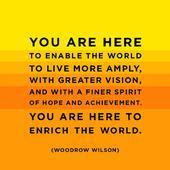A few thoughts from and about an amazing woman, Mary Parker Follett (management consultant, social worker), whose work inspired Peter Drucker and serves as one of many beacons that guide us here at Green Future as we move forward with the IGF project.
Mary Parker Follett Quotes
By Jone Johnson Lewis, About.com Guide
"To free the energies of the human spirit is the high potentiality of all human association."
~Mary Parker Follett
"It seems to me that whereas power usually means power-over, the power of some person or group over some other person or group, it is possible to develop the conception of power-with, a jointly developed power, a co-active, not a coercive power."
~Mary Parker Follett
Every difference that is swept up into a bigger conception feeds and enriches society; every difference which is ignored feeds on society and eventually corrupts it."
~Mary Parker Follett
"This is the problem in business administration: how can a business be so organized that workers, managers, owners feel a collective responsibility?"
~Mary Parker Follett
"We should never allow ourselves to be bullied by "either-or." There is often the possibility of something better than either of two given alternatives."
~Mary Parker Follett
We must remember that most people are not for or against anything; the first object of getting people together is to make them respond somehow, to overcome inertia.
~Mary Parker Follett
Mary Parker Follett (1868-1933)
Mary Parker Follett (1868-1933) was a visionary and pioneering individual in the field of human relations, democratic organization, and management. Born in Massachusetts, in 1892 she entered what would become Radcliffe College, the women's branch of Harvard. She graduated from Radcliffe summa cum laude in 1898. Follett's intensive research into government while at Radcliffe was later published in her first book, The Speaker of the House of Representatives (1909), which was lauded (by, among others, Theodore Roosevelt) as the best study of this office of government ever done.
From 1900 to 1908, Follett devoted herself to social work in the Roxbury neighborhood of Boston. In 1908 she became chairperson of the Women's Municipal League's Committee on Extended Use of School Buildings, and in 1911 she helped open the East Boston High School Social Center. She was instrumental in the formation of many other social centers throughout Boston. Her experience in this area helped to transform her view of democracy. Follett later served as a member of the Massachusetts Minimum Wage Board, and in 1917 she became vice-president of the National Community Center Association. By this time, however, she had turned most of her attention to writing for a wider public regarding what the social centers had taught her about democracy. In 1918 she published her second book, The New State, which is concerned with the human nature of government, democracy, and the role of local community.
In 1924, Follett published her third book, Creative Experience. This work addresses more directly the creative interaction of people through an on-going process of circular response. From this point until her death in 1933, Follett found her most enthusiastic audience in the world of business. Admiration and respect for her work grew on both sides of the Atlantic, and she became a leading management consultant. (Peter Drucker, who discovered Follett's work in the 1950's, is said to have referred to Follett as his "guru.") Her various papers and speeches in this context were published in 1942 by Henry Metcalf and Lionel Urwick in a book called Dynamic Administration. Another celebration of her work in this context is Mary Parker Follett: Prophet of Management, which was edited by Pauline Graham and published in 1995. In 1998, The New State was re-issued by Penn State Press, with a preface by Benjamin Barber. A biography of Follett, written by Joan Tonn, a professor at the College of Management, University of Massachusetts, Boston, is expected to be published next year.
Follett is increasingly recognized today as the originator, at least in the 20th century, of ideas that are today commonly accepted as "cutting edge" in organizational theory and public administration. These include the idea of seeking "win-win" solutions, community-based solutions, strength in human diversity, situational leadership, and a focus on process. However, just as her ideas were advanced for her own time, and advanced when people wrote about them decades after her death, they remain too often unrealized. We recognize them as an inspirational and guiding ideal for us today, at the beginning of the 21st century. It is the intention and the design of the Foundation's programs to continue the effort to bridge ideal and practice in a continuous process that gives rise to true freedom.
http://womenshistory.about.com/od/quotes/a/follett.htm
Thursday, September 23, 2010
Mary Parker Follett
Subscribe to:
Post Comments (Atom)



No comments:
Post a Comment